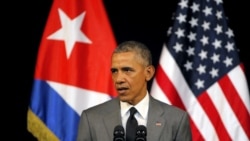In many ways, Cuba has been, until recently, a living relic of the geopolitical battlefield of the 20th century. As much a symbol of the Cold War as the Berlin Wall, Cuba looked on as the Wall came down, as Iron Curtain regimes fell, and as even the Soviet Union, Cuba’s benefactor and main trading partner, disintegrated.
Nevertheless, Cuba continued as before, a Soviet-style Communist regime, despite the disappearance of like-minded governments and severe economic problems resulting from the loss of the Soviet Union’s annual economic subsidies of 6 billion to 8 billion dollars.
Relations between the United States and Cuba were poor since shortly after Fidel Castro’s 1959 revolution, when the new government began to consolidate power and expropriate properties. Five decades, one nuclear crisis and a long U.S. economic embargo later, the relationship between the two countries finally began to thaw in early 2009, when President Barack Obama eased some restrictions on travel to Cuba and on remittances sent by Cuban-Americans to family and friends in Cuba.
In December 2014, President Obama announced that the United States would begin the process of re-establishing diplomatic relations with Cuba. Within 8 months, the two countries opened embassies in each other’s capitals.
On March 20th, President Obama took the relationship another step forward by becoming the first sitting U.S. President in 88 years to visit the island country.
In a speech in Havana, President Obama expressed his confidence that Cuba can play an important role in the hemisphere and around the globe, and said he hoped it can do so as a partner of the United States. Nonetheless, “what changes come will depend on the Cuban people”, he said:
“We will not impose our political or economic system on you. We recognize that every country, every people must chart its own course and shape its own model.”
“I have come here to bury the last remnant of the Cold War in the Americas,” said President Obama. “I have come here to extend a hand of friendship to the Cuban people.”
As shown by the enthusiastic welcome the Cuban people gave President Obama, it is clear that his call for reconciliation, unleashing the potential of Cuba’s civil society and the forging of productive bilateral partnerships found great resonance on the island.






